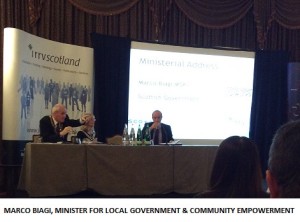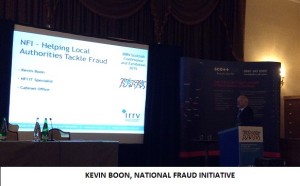For those that weren’t able to make it to this year’s IRRV Annual Scottish Conference we thought we would share some of the key highlights and points discussed throughout the event. A key theme running throughout the conference focussed on austerity and how to deal with ongoing cuts to funding at a local level. On a positive note we heard how this was challenging authorities to focus on more innovative ways of generating revenue and delivering and receiving service.
 We heard from Marco Biagi, the Minister for Local Government and Community Empowerment who noted that Scottish Government would continue to help by contributing £23 million towards extending the Council Tax Freeze going into 2016 to help the most vulnerable. He also noted an ongoing commitment to protect small businesses and help stimulate growth by providing a 50% business rate relief in the first year of trading for small businesses.
We heard from Marco Biagi, the Minister for Local Government and Community Empowerment who noted that Scottish Government would continue to help by contributing £23 million towards extending the Council Tax Freeze going into 2016 to help the most vulnerable. He also noted an ongoing commitment to protect small businesses and help stimulate growth by providing a 50% business rate relief in the first year of trading for small businesses.
Longer term the government are looking at a fairer more progressive tax, based on ability to pay and working with COSLA (Convention of Scottish Local Authorities) and the University of Glasgow, work is being done to benchmark against systems being used by other governments across the globe.
Tackling Corporate Fraud in the Local Authority Arena

Of course it’s not just about relying on contributions and rate reliefs, Councils can also place more emphasis on tackling fraud. We heard from Kevin Boon from the Cabinet Office’s National Fraud Initiative, who noted that since the inception of their data matching tool to detect fraud they had generated over 4.5 million fraud leads and broken the one billion pound mark in terms of revenue. Their ability to batch data match has led to nearly 350,000 fraud leads being generated in Scotland since the start of 2015 achieving £5m in outcomes.
It is therefore worth considering investing in these types of tools which typically match data across a number of systems including the council tax register and the electoral register to help tackle fraud.
Achieving Value for Money in Council Debt Collection
The cost of administering services and collecting revenue should also be a main area of focus for local authorities in these times of austerity. Joy McLaughlin, President of the Society of Messengers-at-Arms and Sheriff Officers (SMASO) noted that value for money is very much about ‘spending less, spending well and spending wisely’. When it came to ‘spending well’ the emphasis should be on ensuring resources deployed for debt collection are maximising service delivery and meeting quality criteria and key strategic goals. In relation to ‘spending wisely’ Joy talked about measurability, ensuring outcomes are being met and asking ‘Are we working efficiently? Are complaint levels reasonable?’
 Joy went on to note some of the unique factors associated with collecting debt in a Local Authority and these go some way to determine the complexities Authorities face and why recovery costs may be harder to control than in other sectors. Local Authorities do not get to choose their customers, they cannot pre-assess someone’s credit-worthiness and the supply of service can’t just be terminated. Similarly debt values can’t be negotiated, security can’t be obtained and debts are recurring in nature.
Joy went on to note some of the unique factors associated with collecting debt in a Local Authority and these go some way to determine the complexities Authorities face and why recovery costs may be harder to control than in other sectors. Local Authorities do not get to choose their customers, they cannot pre-assess someone’s credit-worthiness and the supply of service can’t just be terminated. Similarly debt values can’t be negotiated, security can’t be obtained and debts are recurring in nature.
What to look for from a debt recovery partner
Joy went on to provide some pointers in what to look for in a debt recovery partner. These included Agencies who can focus on the desired outcomes and clearly understand them coupled with effective, efficient resourcing and a willingness to work collaboratively with the Authority. She also noted some more tangible areas such as the ability to handle bulk mailings, mass call handling and provide key performance data. Agencies should also be flexible and responsive to legislative and policy change. In return for this Agencies should expect support and fair commercial remuneration from Authorities and key data should be shared with up to date information, minimal delays and the passing of accurate records.
It was noted that Local Authorities do face more difficulties in levering payment than other sectors as they don’t have the option to simply stop supplying a service. However by benchmarking against what others are doing such as; interdepartmental data sharing, consolidating data across multiple systems as well as leveraging the ability to send text messages with direct links to payment pages – this might go some way in helping.
Look out for the next in our IRRV Scottish Conference blog series which will provide an update on Universal Credit and Welfare Reform.
